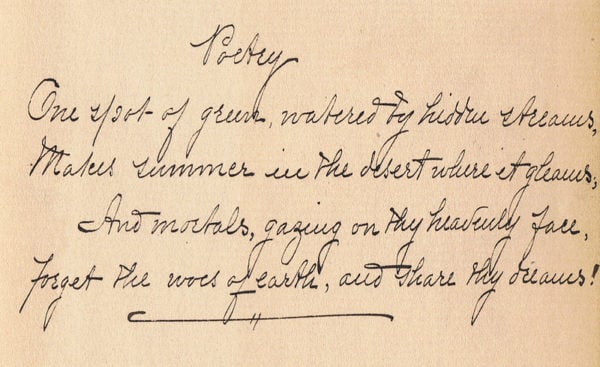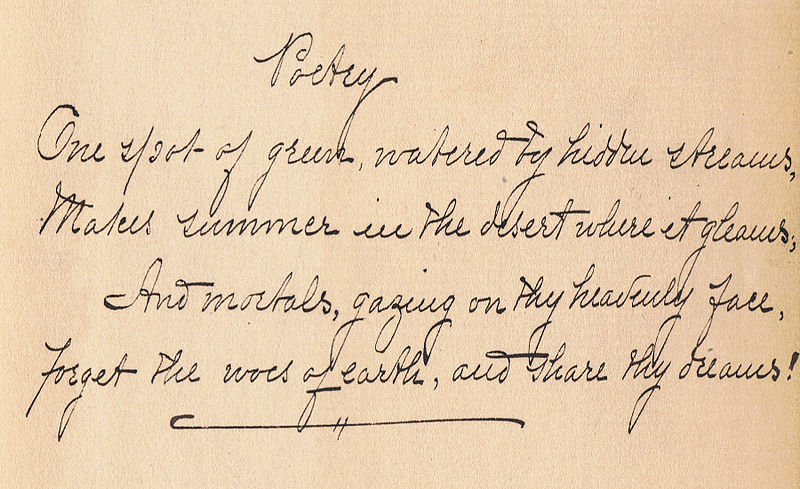
“When a poet goes to war, the resulting work, I think, is stunning,” J. Bruce Fuller mused in his introduction of Graham Barnhart. Barnhart is one of Stanford’s 2017-19 Stegner Fellows, and served as an army medic in Iraq and Afghanistan. An attentive audience had a chance to hear some of Barnhart’s indeed stunning poetry at the Nov. 15 Stegner Reading, along with an excerpt of fiction from Fellow Yoon Choi.
Stanford’s Stegner Fellowship is a two-year writing program, each round offering five poets and five fiction writers a chance to focus intensely on their craft. Fellows are given a living stipend and attend workshops, readings and other events, periodically sharing their work with audiences of creative writing students, faculty and interested community members.
“The trouble with writing war poetry, I think, is reading it,” Barnhart reflected, after his first poem: “Notice and Focus Exercise.” Much of war poetry, as Barnhart pointed out, is “heavy stuff.” It can be heartbreaking, gut-wrenching, depressing and true. He promised the audience that there would be some lighter moments as well, saying, “there’s a joke in here somewhere,” which he quickly followed up with, “not [in] this poem, though.”
Many of Barnhart’s poems struck a poignant balance between the heavy and the gentle. In “Cultivating Mass,” Barnhart begins: “Let the peaceful young men work their bis and tris. Let’s not begrudge them their beach muscle.” He seems to wonder at the attentiveness to building strength, when bodies are inescapably fragile – especially in the setting of war. He read: “Today I can deadlift 405. When I can move 410, that will not stop a bullet, or the overpressure of a bomb.” Despite this harsh truth, the end of the poem is compassionate: “Let the peaceful young men believe, for awhile longer, anything otherwise.”
The previously promised joke did arrive in Barnhart’s poem, “The War Makes Everyone Lonely,” in which he told the “mostly true story” of a correspondence with his sister while he was in Afghanistan. Evidently, her phone number somehow got listed on an escort service website, and she was receiving constant phone calls requesting the services of “Elisha.” His comrades were concerned with their survival, their duty and their loved ones at home; his sister was concerned with her predicament, and whether or not she should engage a lawyer – and Barnhart wondered, “What about Elisha? She must be home, I imagine, counting hits against the number of times the phone hasn’t rung.”
After sharing the poem, Barnhart revealed why it was only a “mostly true” story – his sister notified him, after reading the poem, that the woman’s name was Codi – not Elisha. “But,” Barnhart hedged, “Elisha has more syllables.”
Yoon Choi, the fiction reader at the Stegner Reading, is a Korean-American author hailing from Long Island, New York. She received one of her master’s degrees from Stanford, making this Stegner Fellowship “a homecoming of sorts,” as Jenn Alandy Trahan, a second year fellow, put it in her introduction. Choi’s fiction “investigates the chasms between families living on different continents” – as well as, in some cases, the chasms between families who are under the same roof, as we heard in her reading from “The Art of Losing.”
Although we only got to hear the end of the piece (a “very long short story,” Choi confessed), Choi provided some context before she began reading: A Korean-American family is grappling with assimilation, communication and memory – the grandfather, Mo-Sae, from whose perspective the story is told, is descending into the maze of Alzheimer’s. From his muddled point of view, we learn about the family dynamic, the daily struggles, and greater problems perhaps yet to come.
The section Choi read was from the end of the story. Mo-Sae has been left in charge of his young grandson, Jonathan, which is not supposed to happen. Later on, we learn that something has happened to his wife, Young-Ja, and she is in the hospital. In looking after his grandson, Mo-Sae realizes how complicated every small task becomes with the loss of his memory. He and Jonathan attempt to venture out of their apartment to buy an ice cream, but by the time they have reached the lobby Mo-Sae cannot remember the initial intent of their journey. Not wanting to appear confused, he instead leads them to the pool, and young Jonathan winds up dumping his entire coin jar into the water.
An interesting moment arises when Mo-Sae’s son-in-law arrives at the apartment. He is Indian, and at first Mo-Sae doesn’t recognize him – when he internally identifies the young man, Sanjay, as his son-in-law, we observe a brief but fascinating realization of racial awareness, as Mo-Sae questions whether his daughter, Christina, experiences any difficulty in her relationship with Sanjay.
The relationship between father-in-law and son-in-law appears strained, although this could be due in part to Young-Ja being in the hospital, and Mo-Sae being kept in the dark about the extent of her condition. As they make conversation, Sanjay identifies some plants in the apartment, sharing their scientific names and tips on watering. Mo-Sae thinks, “he seems profoundly relieved to have stumbled upon certain matters of fact.”
Both Choi’s and Barnhart’s work share elements of memory – the memories of a veteran, immortalized in poetry, and the collective memories of a family, the painful slipping of memory with age. Through their poetry and prose, both artists create moments of lives where we can see memories unfolding, dissolving or standing still.
Contact Claire Thompson at clairet ‘at’ stanford.edu.
